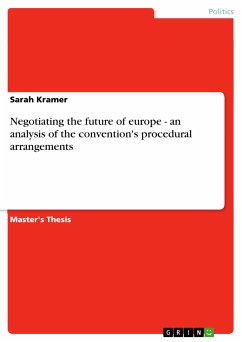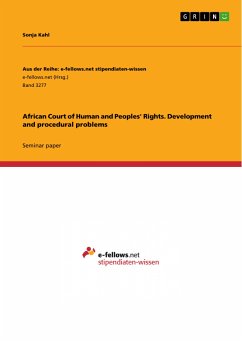Master's Thesis from the year 2002 in the subject Politics - International Politics - Topic: European Union, grade: B+ (12 von 15 Punkten), University of Sussex, language: English, abstract: The dissertation will focus on the Convention on the Future of Europe which was launched in March 2002 and which is operating the task to prepare the next Intergovernmental Conference (IGC) in 2004. Main issues on the Convention’s working plan are a draft constitution and the preparation of EU institutions for the enlargement. Given that the Convention has started its work in March 2002 and will approximately end in Spring / Summer 2003, its work is still in progress. That is why it would be difficult to write on the outcome and either predict or judge its success. That is why the focus lies on the procedural arrangements within the Convention Method and explicitly not on its content. Therefore the dissertation will deal, in general, with the negotiation process. In detail, the focus will examine the Convention’s kind of procedural arrangements, the operative mode and the working method or in short: the Convention Method and its difference compared with former IGCs and their preparing groups. Thus, the dissertation’s main part is build on four parts: The first chapter will set up a definition for an IGC while considering various perspective from legal over formal via practical to theoretical. Then, the second chapter will introduce the history and the task of IGCs and their preparing groups by looking at the setting, procedural arrangements and the mandate, whilst in the third chapter, both conventions, the Convention on the Charter of Fundamental Rights and the Convention on the Future of Europe in the scope of the IGC 2004 will be studied. Then in the final fourth chapter, the key question of “What makes the difference?” will be discussed. Further key questions that fall into the scope of the negotiation process touches to what extend the kind of negotiation process influence the outcome, the harmonization of actors’ position as well as actors’ behaviour.








